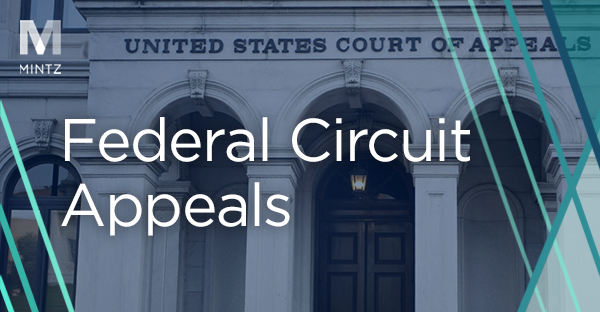
IPRs & Other Post Grant Proceedings
Viewpoints
Filter by:
Federal Circuit Reminds PTAB That Short Cuts Are Not Allowed
August 11, 2020 | Blog | By Brad M Scheller
Last month, in a precedential decision, the Federal Circuit vacated-in-part and remanded the Patent Trial and Appeal Board’s (“Board”) obviousness determination regarding Alacritech’s computer networking patent because the Board failed to adequately explain its findings for three of the challenged claims.
Read more
“Anything Goes” – Federal Circuit Says PTAB Can Use Any Means to Knock Out Substitute Claims (Uniloc v. Hulu: Part 2)
July 29, 2020 | Blog | By Brad M Scheller
Yesterday we discussed the Federal Circuit’s decision in Uniloc 2017 LLC v. Hulu, LLC confirming the Board’s authority to review contingent substitute claims after the original claims have been held invalid by a federal court. Today we cover the panel’s ruling that the Board can use any patentability requirement to evaluate and reject proposed substitute claims in an IPR, notwithstanding that originally-petitioned claims in such proceedings can only be challenged under §§ 102 and 103 based on prior patents and printed publications.
Read more
Dead on Arrival? Federal Circuit Majority Finds That Substitute Claims Live On (Uniloc v. Hulu: Part 1)
July 28, 2020 | Blog | By Brad M Scheller
Last week a Federal Circuit panel in Uniloc 2017 LLC v. Hulu, LLC issued an important decision regarding inter partes review (IPR) before the Patent Trial and Appeal Board on two questions concerning contingent motions to amend—(i) whether the Office has statutory authority to review the patentability of substitute claims after a final federal-court judgement of invalidity of those claims and, if yes, (ii) whether that review of patentability may include analyzing the substitute claims for patent eligibility under 35 U.S.C. § 101.
Read more
IPR and Fast-Moving District Court Litigation: PTAB Formalizes the Analysis for Balancing Efficiency and Fairness
July 17, 2020 | Blog | By Michael Renaud, Daniel Weinger, Adam Rizk, Serge Subach
The Patent Trial and Appeal Board (“PTAB”) has designated two key institution decisions as “Informative.” With these informative decisions, the PTAB has provided guidance on how the PTAB will apply efficiency and fairness factors that guide decisions to institute an inter partes review (“IPR”) when there is a fast-moving parallel district court litigation that may reach trial before the PTAB’s final written decision would be due.
Read more
Shifting “Sands”: New Facts on the Ground Justify Institution of a Previously-Denied IPR
June 25, 2020 | Blog | By Michael Renaud, Adam Rizk, Daniel Weinger, Serge Subach
In a rare reversal, the Patent Trial and Appeal Board (“PTAB”) reassessed the Fintiv factors in a decision on a petition for rehearing of a previous decision denying institution of an inter partes review (“IPR”).
Read more
PTAB Designates As Informative a Decision Instituting Post-Grant Review for a Design Patent Lacking Ornamentality
June 16, 2020 | Blog | By Brad M Scheller , Meena Seralathan
On June 11, 2020, the Patent Trial and Appeal Board (“PTAB”) designated as informative a July 26, 2019 institution decision granting post-grant review of a design patent for lacking ornamentality. In this ruling, the PTAB provides insight into how it analyzes the unpatentability of a design patent due to lack of ornamentality in post-grant proceedings at the institution stage.
Read more
Better Early Than Never: PTAB Confirms Willingness to Deny Institution In Light of Advanced State of Parallel Litigation
May 18, 2020 | Blog | By Michael Renaud, Daniel Weinger, Serge Subach
The Patent Trial and Appeal Board (“PTAB”) recently sent a warning to alleged infringers not to wait for the one year deadline to file IPR petitions, or risk discretionary denial. On May 13, 2020, the PTAB exercised its discretion to deny institution of an inter partes review (“IPR”) petition filed by Apple due to the advanced state of a parallel district court litigation in the Western District of Texas.
Read more
Federal Circuit Narrows Availability for IPR Appeals Under Arthrex
May 14, 2020 | Blog | By Marc Morley
By recognizing a constitutional deficiency in the appointment of Patent Trial and Appeal Board (“PTAB”) judges, the Federal Circuit in Arthrex, Inc. v. Smith & Nephew, Inc., 941 F.3d 1320 (Fed. Cir. 2019) set the stage for numerous appeals by parties unhappy with a PTAB decision and seeking a do-over with a new panel.
Read more
PTAB Presses Pause On All Arthrex Remands
May 12, 2020 | Blog | By William Meunier , Daniel Weinger, Matthew Galica
On Friday, May 1, 2020, Chief Administrative Patent Judge Scott R. Boalick of the Patent Trial and Appeal Board (“PTAB”) paused all activity in the significant number of PTAB cases remanded to it from the Federal Circuit under Arthrex (discussed here).
Read more
PTAB’s Decision Providing Factors for Denying Institution Based on Close Trial Date is Precedential; PTAB De-Designates One-Year Time Bar Decision
May 7, 2020 | Blog | By Daniel Weinger, Serge Subach
On May 5, 2020, the Patent Trial and Appeal Board (“PTAB”) designated one decision as precedential and removed the precedential designation on another. The newly-designated precedential opinion lays out factors that the PTAB considers when asked to exercise its discretion to deny institution in light of an imminent trial.
Read more
Federal Circuit Holds that Accused Infringers that Invalidate Asserted Patents at the PTAB Can Be a Prevailing Party Under Section 285
April 28, 2020 | Blog | By Daniel Weinger, Meena Seralathan
Last week, the Federal Circuit, in a precedential decision, reinforced that an accused infringer can be a “prevailing party” for the purposes of seeking attorneys’ fees under 35 U.S.C. § 285 when it successfully invalidates the asserted patent at the Patent Trial and Appeal Board (“PTAB”).
Read more
Federal Circuit Finds IPRs Can Circumvent Assignor Estoppel
April 27, 2020 | Blog | By Daniel Weinger
On Wednesday, the Federal Circuit held that while assignor estoppel is applicable in district court proceedings, petitions for inter partes review continue to not be subject to the equitable remedy. Assignor estoppel is an equitable doctrine based on the principle of fair dealing that prevents a party who divests a patent from later challenging the validity of that patent.
Read more
SCOTUS holds that PTAB Time-Bar Determinations are Not Reviewable on Appeal
April 22, 2020 | Blog | By Michael Newman, Serge Subach
On Monday, in Thryv, Inc. v. Click-to-Cal Technologies, the Supreme Court held that § 315(b) time-bar determinations are not subject to judicial review. In this 7-2 decision penned by Justice Ginsburg, with Justices Gorsuch and Sotomayor dissenting, the Court determined that time-bar determinations are unreviewable because they are “closely tied” to the Director’s decision to institute an inter partes review (IPR).
Read more
Informative Whirlpool Decision Reaffirms Importance of Secondary Considerations
April 21, 2020 | Blog | By Brad M Scheller , Courtney Herndon
Recently on April 14, 2020, the Patent Trial and Appeal Board (“Board”) designated Ex parte Whirlpool Corp., Appeal 2013-008232 (Oct. 30, 2013) “Informative”. In Whirlpool, the Board reversed the Examiner’s obviousness rejection of claims 1, 4, 6, and 8 of U.S. Patent No. 6,082,130 (“the ’130 patent”), finding that the Patent Owner, Whirlpool Corporation, established a nexus between its objective evidence of non-obviousness and the claimed invention.
Read more
Recently Designated Precedential PTAB Decision Confirms Objective Indicia of Nonobviousness Can Rescue Patents from Invalidation at the PTAB
April 21, 2020 | Blog | By Brad M Scheller , Meena Seralathan
Last week, the Patent Trial and Appeal Board (“PTAB”) designated a January 24, 2020 decision, finding objective indicia of nonobviousness, such as evidence of long-felt need and industry praise, saved a patent owner’s amended claims from invalidation, as precedential.
Read more
PTAB Must Give Parties Notice of Unpatentability Theories when Considering Motions to Amend
April 14, 2020 | Blog | By Daniel Weinger
On Thursday, the Federal Circuit ruled that the Patent Trial and Appeal Board (“PTAB”) must give the parties proper notice if considering a sua sponte theory of unpatentability in relation to a motion to amend.
Read more
PTAB’s Precedential Opinion Panel Rejects Review of Decision Denying Institution Due to Proximity of District Court Trial, and Remands Back to Panel for Supplemental Briefing
April 14, 2020 | Blog | By Daniel Weinger
The Precedential Opinion Panel (“POP”) of the U.S. Patent Trial and Appeal Board (“Board”) recently rejected a rehearing request from a petitioner where institution was denied because of the likelihood that a district court trial would occur prior to a final written decision.
Read more
The PTAB Designates Three Decisions Related to Discretion to Institute as Precedential or Informative
March 26, 2020 | Blog | By Daniel Weinger
On Tuesday, March 24, 2020, the Patent Trial and Appeal Board (“PTAB”) designated two inter partes review (“IPR”) decisions as precedential and one as informative. These decisions concern PTAB’s discretion to deny institution of an IPR under 35 U.S.C. § 325(d) and 314(a).
Read more
An Informative PTAB Decision on Patent Eligibility under 35 U.S.C. § 101
January 30, 2020 | Blog | By Christina Sperry
The U.S. Patent Trial and Appeal Board (“PTAB”) recently designated its decision in Ex Parte HANNUN (Appeal 2018-003323) (“HANNUN”) as being informative regarding the application of the latest 2019 revised guidance on patent-eligible subject matter.
Read more
PTAB allows Amending Claims on Grounds not raised by Petitioner, but were Addressed by the District Court in its Finding of Indefiniteness
December 10, 2019 | Blog | By William Meunier
To amend challenged claims during an Inter Partes Review (IPR), the patent owner must show that the proposed amendment responds to a ground of unpatentability at issue in the IPR trial.
Read more
Explore Other Viewpoints:
- Data Centers & Digital Infrastructure
- AI: The Washington Report
- Antitrust and Federal Regulation
- Appellate
- Arbitration, Mediation & Alternate Dispute Resolution
- Artificial Intelligence
- Awards
- Bankruptcy & Restructuring
- California Land Use
- Cannabis
- Class Action
- Complex Commercial Litigation
- Construction
- Consumer Product Safety
- Corporate Governance (ESG)
- Cross-Border Asset Recovery
- DEI Legal Developments
- Debt Financing
- Direct Investing (M&A)
- Diversity
- EB-5 Financing
- Education & Nonprofits
- Employment
- EnforceMintz
- Environmental (ESG)
- Environmental Enforcement Defense
- Environmental Law
- Environmental, Social, and Corporate Governance (ESG)
- FDA Regulatory
- False Claims Act
- Federal Circuit Appeals
- Financial Institution Litigation
- Government Law
- Growth Equity
- Health Care
- Health Care Compliance, Fraud and Abuse, & Regulatory Counseling
- Health Care Enforcement & Investigations
- Health Care Transactions
- Health Information Privacy & Security
- IP Due Diligence
- IPRs & Other Post Grant Proceedings
- Immigration
- Impacts of a New US Administration
- Insolvency & Creditor Rights Litigation
- Institutional Investor Class Action Recovery
- Insurance & Financial Services
- Insurance Consulting & Risk Management
- Insurance and Reinsurance Problem-Solving & Dispute Resolution
- Intellectual Property
- Investment Funds
- Israel
- Licensing & Technology Transactions
- Life Sciences
- Litigation & Investigations
- M&A Litigation
- ML Strategies
- Managed Care
- Medicare, Medicaid and Commercial Coverage & Reimbursement
- Mergers & Acquisitions
- Patent Litigation
- Patent Prosecution & Strategic Counseling
- Pharmacy Benefits and PBM Contracting
- Portfolio Companies
- Privacy & Cybersecurity
- Private Client
- Private Equity
- Pro Bono
- Probate & Fiduciary Litigation
- Products Liability & Complex Tort
- Projects & Infrastructure
- Public Finance
- Real Estate Litigation
- Real Estate Transactions
- Real Estate, Construction & Infrastructure
- Retail & Consumer Products
- Securities & Capital Markets
- Securities Litigation
- Social (ESG)
- Special Purpose Acquisition Company (SPACs)
- Sports & Entertainment
- State Attorneys General
- Strategic IP Monetization & Licensing
- Sustainable Energy & Infrastructure
- Tax
- Technology
- Technology, Communications & Media
- Technology, Communications & Media Litigation
- Trade Secrets
- Trademark & Copyright
- Trademark Litigation
- Unified Patent Court (UPC)
- Value-Based Care
- Venture Capital & Emerging Companies
- White Collar Defense & Government Investigations
- Women's Health and Technology



